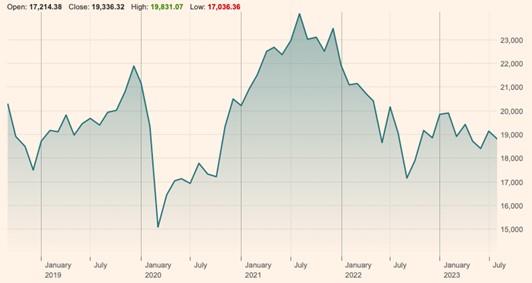Why is the FTSE flying while the UK economy is foundering?
If you’re puzzled by the mismatch between a flying FTSE100 and a foundering UK economy, you’re not alone. But, the mismatch is more about the differences between the UK and the world at the moment – and it also masks an important FTSE truth: stock markets are grinding their way upwards, irrespective of poor economic performance.
Politics and Inflation
On Thursday 16 February 2023, political turmoil took yet another direction with Nicola Sturgeon’s resignation.
Inflation stood at 9.3%[1], interest rates had just jumped to 4% – following Liz Truss’s disastrous premiership – and the FTSE 100 hit a record high[2].
Markets not economics
Yes, you read that right.
That same day, the main index of UK-listed companies hit its highest point ever: 8047[3]. It closed the day a little down, at 8012, but that was still the highest ever close. On the following Monday it closed yet higher at 8014.
As I write it’s hovering around 7500 – still a historically high level.
So, what’s going on?
Oil not tech
The main index has a handful of large energy firms – and comparatively few technology companies. The former did very well, the latter less so.
Back in 2020, oil prices hit a record low. With planes essentially grounded and cars sitting on driveways, demand dried up. But, once the pandemic ended, oil prices rose almost fourfold [4]. Gas prices are up too, following Russian folly in Ukraine.
The FTSE 100’s energy companies have benefitted considerably. Over the last year, Shell is up around 14% and BP by 15%.
Conversely, the big tech stocks – such as Apple, Microsoft, Tesla and Meta – all had a difficult patch in late 2022 and early 2023. They’re clawing their way back now, but those hefty losses were borne mainly by American or international investors. These companies aren’t listed on the FTSE100.
Global not local
It’s probably worth remembering that the FTSE100 is mainly international companies. In fact, there’s an argument that it’s a better barometer of the global economy than the UK economy.
Antofagasta is a Chilean mining company; Rio Tinto an Anglo-Australian miner; Coca Cola … well you get the picture.
Plenty of the British firms listed on the index are international firms, like IT company Rexl, engineering group Weir, testing laboratories provider Intertek, and the food service firm Compass.
Even venerable high street names, like Burberry, Barclays, Vodafone and – yes – JD Sports make much of their money overseas. So successful is the latter that more than 60% of its c.£1bn in revenue for the year to January 2023 came from Europe, North America and Asia Pacific[5].
It’s reasonable to conclude that young Americans worry about getting the latest trainers more than about UK inflation, the cost-of-living crisis or – dare I say it – Nicola Sturgeon.
FTSE250 not FTSE100
I’d say if you’re going to look at a market, it’s far better to keep your eye on the FTSE250. This measures the performance not of the 100 biggest companies, but the UK’s next 250 biggest.
The fortunes of companies like Easyjet, Games Workshop, Tate & Lyle, ITV and Greggs tell you much more about the health of UK plc than Chilean miners ever can.
How has it the FTSE250 doing?

Figure 1. FTSE250 price performance in the 5 years to 14 August 2023
A muted performance over the last five years – compared to the FTSE 100 – but no towering spikes or precipitous falls either. I’d say that’s pretty respectable and also a pretty accurate reflection of how people are feeling about the economy.
Long term not short term
But perhaps it’s better not to look at markets at all – or at least not regularly.
That’s because it’s easy to get sucked into short-term news, the terrifying drops and the giddy climbs.
Such ups and downs tend to obscure the bigger, more important truth: they go up over the long run. For example, in the decade since 1 September 2013:
- the FTSE 100 is up from 6462 to 7524: +16%
- the FTSE250, up from 14908 to 18799: +26%
- America’s S&P 500, from 1681 to 4464: +165%
- Germany’s DAX index, from 8594 to 15832: +84%
These are the sort of numbers that anyone looking to grow their wealth should look at.
It’s obviously hard to focus on these longer-term data – especially when headlines scream doom and gloom – but they are the bedrock facts on which you can build a wealth portfolio.
And once you’ve built your portfolio, all you have to do is sit back and watch it grow. Sometimes it will take a backwards step, but it’s still going forward, over the long run.
Clearly, we have a fragile economy in the UK at the moment. People are worried about jobs, their future, the environment, whether their train will actually turn up. It would be foolish to deny this.
But all the facts point to stock markets grinding their way upwards over the long run. That’s a crumb of comfort.
[1] https://www.ons.gov.uk/economy/inflationandpriceindices/bulletins/consumerpriceinflation/june2023#:~:text=a%20year%20earlier.-,The%20Consumer%20Prices%20Index%20(CPI)%20rose%20by%207.9%25%20in,of%2011.1%25%20in%20October%202022.
[2] All markets data sourced from FT.com
[3] FT.com
[4] https://tradingeconomics.com/commodity/crude-oil
[5] https://www.jdplc.com/sites/jd-sportsfashion-plc/files/2023-05/jd-fy-results-presentation-23.pdf
This document is marketing material for a retail audience and does not constitute advice or recommendations. Past performance is not a guide to future performance and may not be repeated. The value of investments and the income from them may go down as well as up and investors may not get back the amount originally invested.
Let's Talk
Book a FREE 30-minute Teams call and we’ll answer your questions. No strings attached.
Check Availability




